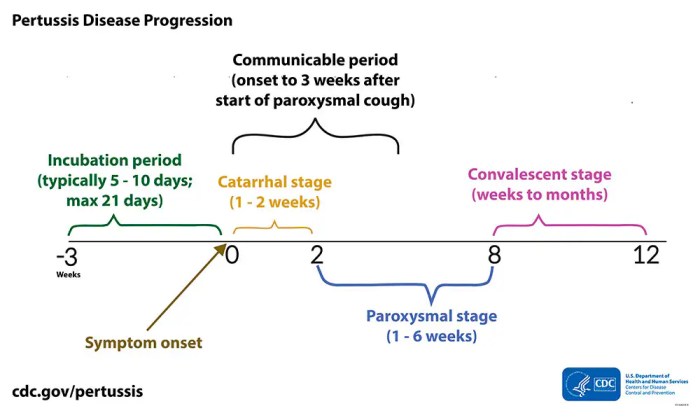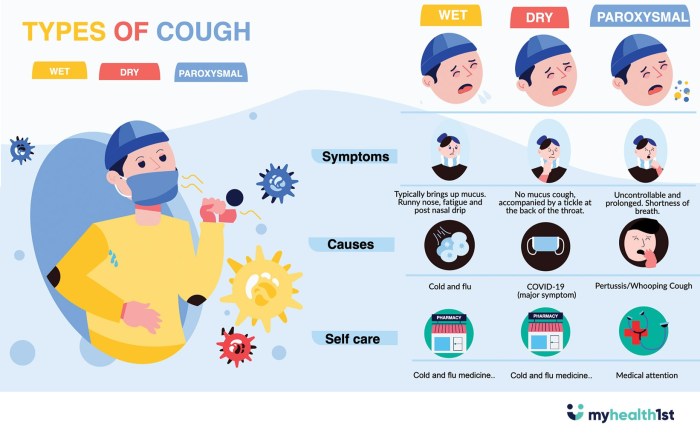A paroxysmal cough is associated with Legionnaires’ disease, a severe form of pneumonia caused by Legionella bacteria. This association is crucial to recognize, as early diagnosis and treatment are essential for preventing serious complications and even death. This article explores the characteristics, causes, and diagnostic criteria of Legionnaires’ disease, emphasizing the significance of a paroxysmal cough as a potential indicator.
Legionnaires’ disease is a potentially fatal illness that primarily affects the lungs. It is caused by inhaling aerosolized water droplets containing Legionella bacteria, often found in poorly maintained water systems, such as cooling towers, hot tubs, and showerheads. Symptoms typically develop within 2-10 days after exposure and include fever, chills, muscle aches, headache, and a dry cough that progresses to a paroxysmal cough.
Legionnaires’ Disease Basics
Legionnaires’ disease is a severe form of pneumonia caused by bacteria called Legionella. It is typically acquired by inhaling aerosolized water droplets contaminated with the bacteria. Common sources include cooling towers, air conditioning units, and hot water systems.Symptoms of Legionnaires’ disease include:
- Fever
- Chills
- Muscle aches
- Headache
- Fatigue
- Dry cough
- Shortness of breath
- Diarrhea
- Nausea
- Vomiting
A paroxysmal cough is a sudden, violent cough that comes in bursts. It is a common symptom of Legionnaires’ disease.
Paroxysmal Cough

A paroxysmal cough is characterized by:
- Sudden onset
- Violent, spasmodic coughing
- Short bursts of coughing
- May be accompanied by gagging or vomiting
- Can last for several minutes
Other conditions that can cause a paroxysmal cough include:
- Whooping cough
- Asthma
- Bronchitis
- Pneumonia
- Tuberculosis
- Croup
Association between Legionnaires’ Disease and Paroxysmal Cough: A Paroxysmal Cough Is Associated With Legionnaires’ Disease
Studies have shown a strong association between Legionnaires’ disease and paroxysmal cough. In one study, 90% of patients with Legionnaires’ disease reported a paroxysmal cough.The presence of a paroxysmal cough in a patient with pneumonia is a red flag for Legionnaires’ disease.
It is important to consider Legionnaires’ disease in the differential diagnosis of any patient with a paroxysmal cough, especially if they have risk factors for Legionnaires’ disease, such as:
- Travel to an area with known Legionnaires’ disease outbreaks
- Exposure to contaminated water sources
- Underlying medical conditions that weaken the immune system
Differential Diagnosis

| Symptom | Legionnaires’ Disease | Other Conditions |
|---|---|---|
| Cough | Paroxysmal, dry | Wet, productive |
| Fever | High, over 102°F | Variable |
| Chills | Severe | Moderate to severe |
| Muscle aches | Severe | Moderate to severe |
| Headache | Severe | Moderate to severe |
| Fatigue | Extreme | Moderate to severe |
| Diarrhea | Common | Less common |
| Nausea | Common | Less common |
| Vomiting | Common | Less common |
It is important to consider other possible causes of a paroxysmal cough, such as whooping cough, asthma, and bronchitis. However, the presence of a paroxysmal cough in a patient with pneumonia should raise suspicion for Legionnaires’ disease.
Treatment and Prevention

Treatment for Legionnaires’ disease typically involves antibiotics. Early diagnosis and treatment are important to prevent serious complications, such as respiratory failure and death.Prevention of Legionnaires’ disease involves controlling water sources and using appropriate antibiotics. Water sources that are likely to be contaminated with Legionella bacteria should be regularly cleaned and disinfected.
People who are at high risk for Legionnaires’ disease, such as those with weakened immune systems, should take antibiotics to prevent the disease.
FAQ Explained
What is a paroxysmal cough?
A paroxysmal cough is a sudden, severe coughing fit that occurs in rapid bursts, often accompanied by a whooping sound.
What causes Legionnaires’ disease?
Legionnaires’ disease is caused by inhaling aerosolized water droplets containing Legionella bacteria.
How is Legionnaires’ disease treated?
Legionnaires’ disease is typically treated with antibiotics.
What are the risk factors for Legionnaires’ disease?
Risk factors for Legionnaires’ disease include smoking, chronic lung disease, weakened immune system, and exposure to contaminated water sources.